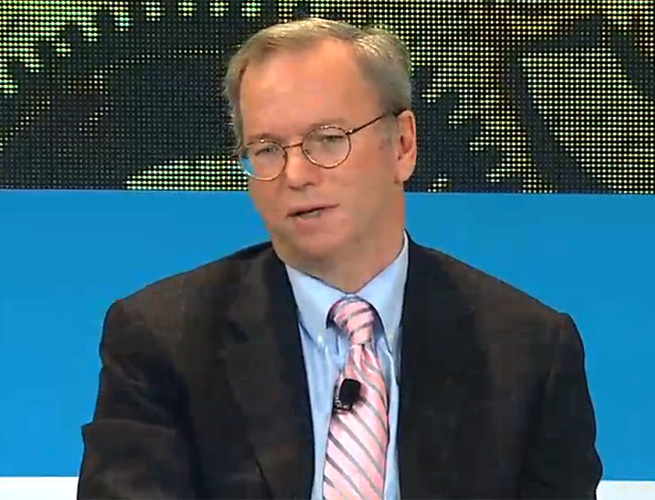Google executive chair Eric Schmidt caught 10 nonprofits by surprise when he unveiled they would split his 1 million dollar New Digital Age grant yesterday.
“There was no application process for the grant, the organizations that were picked had no idea that they were being considered,” said Diana del Olmo, Communications Manager of the Guardian Project, one of the recipients of the grant. “We were notified a couple of days ago and nobody expected this to happen.”
The grant comes ahead of the release of his new book, The New Digital Age, coauthored by Google Ideas founder Jared Cohen.
The award was first announced in late February in an interview with CBS about the book. Schmidt and Cohen reportedly traveled to over 40 countries to see how technology is being used to solve world problems.
Schmidt’s spokesperson for the book, Angela Baggetta declined to comment on how the awardees were chosen.
Regardless of how they were shortlisted, recipients were of course grateful for the funding.
“We’re humbled by Eric Schmidt’s generosity,” said Allen Gunn, Executive Director of grant winner Aspiration, a company that aims to help nonprofits pinpoint their tech needs.
Indeed, Schmidt is donating out of his own pocket — according to his press release, the money comes from a private donation.
“I felt it was important to encourage organizations that are using [the funds] to solve some of our most pressing problems,” he said in the same press release.
Schmidt’s grant-winning companies have mission statements that run along the same threads as the topics his book will discuss, from issues of privacy and surveillance.to broadening the reach of technology around the world and tracking violence and illegal activity.
Here’s a complete breakdown of who won, and what they’re doing with the dough:
1. KoBoToolBox bring technology to hard-to-reach areas. KoBo develops apps for data collection for fieldworkers in disaster-stricken areas. The organization already has a suite for collecting, mapping, and syncing data, and hopes to use the grant to launch a more streamlined UI.
“Concretely, this award will help us finalize and release a new version of KoBoToolbox, a big leap really,” said Patrick Vinck, a research scientist at the Department of Global Health and Population at Harvard and one of the founders of the project.
2. Aspiration, a San Francisco-based company, acts as tech advisor to help activists and nonprofits “aspiring” (my use, not theirs) to keep up with the breakneck pace of technological change. In addition to individualized advisory services, the company arranges meetups, conferences, and workshops on web and tech strategies in over 40 countries.
Gunn told VentureBeat that although plans for the funds are far from final, the company may share Schmidt’s grant with organizations it has collaborated with, as well as to expand its infrastructure and reach in the Global South.
3. The Guardian Project is a developer of secure, open-source communications tools for mobile devices. This is the project behind apps like the secure smartcamera Obscuracam, hidden messages with Pixelknot, etc.
Del Olmo said the group plans on continuing to test secure chat systems like ChatSecure for Android and iOS. The project also plans to support I.M.AWESOME, a decentralized way of sending text messages.
4. Citizen Lab, based at Toronto University, was the only Canadian winner. The Lab focuses on research on surveillance and privacy. One of its current projects includes Opennet.Asia, an effort to monitor Internet surveillance in Asia.
5. Portland State University was recognized for Professor Tom Shrimpton’s research on network traffic obfuscation techniques.
6. Open Technology Institute in D.C. developers were recognized for focusing on building a free and open Internet. The Institute plans to put Schmidt’s funding towards a Measurement Lab that will measure government repressiveness globally.
7. The Igarapé Institute is the sole South American award recipient on Schmidt’s list. This bilingual thinktank is dedicated to analyzing global and national drug policy and violence reduction.
Research Director and Program Coordinator for Violence Reduction Robert Muggah said the institute plans to put the funding towards a number of 2014 initiatives, including police oversight Android apps, a “child security index” to track violence against young children, as well as other public security projects across Latin America and the Caribbean.
8. C4ADS is a D.C-based research team that harnesses the power of public records to track illicit activities across national borders like the Soviet-era arms trade and unmasking of Somali pirates.
9. The Citizen Integration Center in Monterrey, Mexico, was recognized for its community-driven tipline.
10. The New Media Advocacy Project, which monitors human rights abuses from violence against women and children in Armenia to the liberties of people with disabilities across the globe.
New Media Advocacy Deputy Director Abby Goldberg says that the project will use the funds to refine and expand its work.
“We did have funding before … but this funding will allow us to take it to the next level,” she said.
VentureBeat's mission is to be a digital town square for technical decision-makers to gain knowledge about transformative enterprise technology and transact. Learn More

